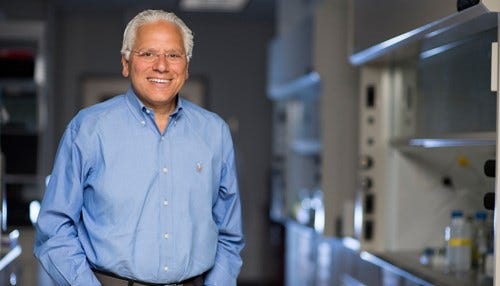Promoting university-based research targeting intractable medical challenges

Subscriber Benefit
As a subscriber you can listen to articles at work, in the car, or while you work out. Subscribe NowScientists work incessantly for years to discover solutions that pertain to the most vexing global challenges. While the slow and uneven pace in scientific advances can test personal commitment, it is the genuine love for what we do that propels us forward. It is the inquisitive mind, and an unending drive to answer difficult questions while formulating new ones, that resides at the core of a true scientist.
Within the broader set of university scientists resides a minorty motivated by translational interests. They occasionally evolve into entrepreneurs championing their academic discoveries toward commercialization, with the informed assistance of technology transfer offices and seasoned industry experts. Conducting targeted discovery, establishing business plans, protecting intellectual property, assembling license agreements and conducting clinical trials that adhere to regulatory requirements are not common practice for university faculty, but they are imperative to master for those who quest to see their ideas successfully mature for societal benefit.
What distinguishes research in an academic setting from what is more appropriately conducted in a startup biotechnology company or a well-established, global pharmacecutical company? Are such laboratories and their scientists in those latter categories inherently competitive by design? Is research more appropriate at one location than another at various times in the life cycle of maturing an idea to a drug candidate, and eventually a registered medicine? Is there a more enlightened approach to accelerating discovery of breakthrough medicines that might be delivered at a financial cost of only a fraction of currently quoted expense? These are critical questions because the costs to develop drugs continue to skyrocket and federal agencies are more focused on practical outcomes of the research they fund.
A half-day seminar coming up on Nov. 12, titled "Break on through to the Other Side: How Academic Research Matures to Breakthrough Medicines," will bring together select Indiana University scientists, entrepreneurs and public policy experts to discuss the strengths, limitations and opportunities within the innovation ecosystem at the university. Questions to be examined will include:
- What distinguished the academic discoveries at IU that have successfully progressed to well-financed companies that are managing clinical drug candidates against diseases such as hepatitis B, diabetes and obesity?
- From where did the nontechnical assets and personal resources emerge that promoted these startups to the next level of commercialization?
- Can university policies and processes be improved to better support startup companies?
- Finally, in looking forward, is there good reason to believe that the lessons learned from these recent successes are likely to be valid in a public environment where medical care and drug delivery are hotly contested?
History has proven that advances in technology have the power to advance civilization and further economic prosperity in the communities that promote and deliver meaningful discoveries. Indiana has the requisite skill set to contribute in this period of unprecedented advances in the life sciences, but general awareness of the resources and coordination available has often been challenging to achieve.
It is our intent to broaden the discussion and entertain a larger audience in the quest to recruit a larger academic community in the translation of fundamental academic discoveries to societal benefit. While simultaneously working to discover and develop the next generation of breakthrough therapeutics, we will seek to advise those who are similarly interested in doing likewise.
Learn more about Break-On Through to the Other Side: How Academic Research Matures to Breakthrough Medicines, an event hosted by the IU Innovation & Commercialization Office.
Dr. Richard DiMarchi is a Distinguished Professor in the Department of Chemistry, and the Linda & Jack Gill Chair in Biomolecular Science at Indiana University.
